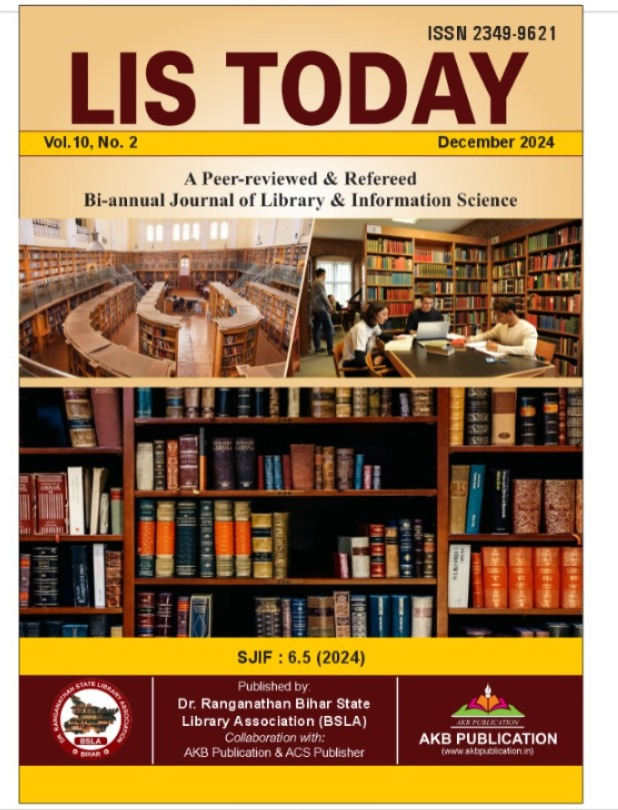The Role of Indian Academic Libraries in Advancing and Achieving Sustainable Development Goals
DOI:
https://doi.org/10.48165/lt.2024.10.5Keywords:
Sustainable Development Goals, Academic Libraries, Digital Infrastructure, Lifelong Learning, Library Policies, Gender Equality, Global Collaboration.Abstract
This study aims at defining the role of academic libraries in supporting the sustainable development goals in the global quest as the United Nations calls for. Academic libraries play important roles in supporting SDGs – particularly Quality Education (Goal 4), Gender Equality (Goal 5), Reducing Inequalities (Goal 10), and Strengthening the Means of Implementation, Partnerships (Goal 17). To this end, this paper seeks to discuss how academic libraries in India can function as a service provider in the achievement of these goals through assimilating their services, collections, and policies into the IDAG. The research explores how these libraries support educational justice, enable the disenfranchised, establish gender parity, and build cooperation through openness and the use of digital tools. However, critical roles notwithstanding, challenges that academic libraries face in India include limited funding sources, digital resource constraints, professional development opportunities, and low levels of networking both nationally and internationally. Additionally, a general lack of understanding of what the libraries can and should do with reference to the promotion of the SDGs limits potential. Besides, the paper also discusses the current research findings regarding the contributions of Indian academic libraries towards sustainable development and adds the strategies for future enhancement for achieving the sustainable development goals by 2030.
References
Atta-Obeng, L., & Dadzie, P. S. (2020). Promoting sustainable development goal 4: The role of academic libraries in Ghana. The International Information & Library Review, 52(3), 177–192. https://doi.org/10.1080/10572317.2019.16
75445
Banerjee, S. (2023). Mapping the status of public libraries of Asian countries in the context of the aims of United Nations’ sustainable development goals: An analysis of IFLA’s Library Map of the World. 12(2), 29. https://openurl.ebsco.
com/contentitem/gcd:177058664sid=ebsco:plink:crawl er&id=ebsco:gcd:177058664
Ezeani, C. N., Ukwoma, S. C., Gani, E., Igwe, P. J., & Agunwamba, C. G. (2017). Towards sustainable development goals: What role for academic libraries in Nigeria in assuring inclusive access to information for learners with special needs? http://
library.ifla.org/id/eprint/1679/
Gupta, S. (2020). Green library: A strategic approach to environ mental sustainability (SSRN Scholarly Paper No. 3851100). https://papers.ssrn.com/abstract=3851100
Khalid, A., Malik, G. F., & Mahmood, K. (2021). Sustainable development challenges in libraries: A systematic literature review (2000–2020). The Journal of Academic Librarianship, 47(3), 102347. https://doi.org/10.1016/j.acalib.2021.102347
Mashroofa, M. M. (2022). Contribution of academic libraries towards sustainable development goals. http://ir.lib.seu. ac.lk/handle/123456789/6033
Mbagwu, F., Lyaka, M., Kiwelu, J., Nyantakyi-Baah, L., & Holmner, M. (2020). Achieving sustainable development goals two and three: Role of academic libraries. Library Philosophy and Practice (e-Journal). https://ecommons.aku.
edu/libraries/85
Missingham, R. (2024). Australian academic libraries and the United Nations sustainable development goals. IFLA Journal. https://doi.org/10.1177/03400352241252973
Omona, W. (2020). The roles of library and information ser vices in achieving sustainable development goals (SDGs) in Uganda.
Panda, S., & Das, S. K. (2023). Implementation of achiev ing the United Nations sustainable development goals (SDGs) by the National Library of India: An assessment study [Jadavpur University]. https://shodhganga.inflibnet. ac.in:8443/jspui/handle/10603/529929
Panda, S., Kaur, P., & Kaur, N. (2023). Role of agriculture librar ies in advancing sustainable development goals: A study in Indian perspective (SSRN Scholarly Paper No. 4616545). https://papers.ssrn.com/abstract=4616545
Poluru, L. (2020). Sustainable development goals (SDGs): The role of libraries and access of information for transforma tion.
Sarkar, D. (2020). Sustainable development as a goal: Special reference to green library. International Journal of Research in Library Science, 6(1), 182. https://doi.org/10.26761/ IJRLS.6.1.2020.1322
Singh, C. I., Brahma, S., & Vaiphei, L. (n.d.). National informa tion and library policies in support of the UN sustainable development goals: Perspectives in India.
Solemanpharcy, M., & Gaffar, S. K. A. (2023, March 1). The role of green library for sustainable development goals and environ mental education: A study on global perspective. International Journal of Knowledge Management & Practices. https:// openurl.ebsco.com/contentitem/gcd:170910862?sid=eb sco:plink:crawler&id=ebsco:gcd:170910862
Thorpe, C., & Gunton, L. (2022). Assessing the United Nations’ sustainable development goals in academic libraries. Journal of Librarianship and Information Science, 54(2), 208–215. https://doi.org/10.1177/09610006211005528
Vijesh, P. V., Chopade, V., Joy, V., & K, J. M. (2024). Designing a green library in alignment with the UN’s sustainable develop ment goal: A case study of Rajagiri Business School Library, Kerala, India. 49, 1. https://doi.org/10.5070/G314960177
United Nations. (2015). Transforming our world: The 2030 agenda for sustainable development. United Nations General Assembly.
International Federation of Library Associations and Institutions (IFLA). (2017). Libraries, development, and the United Nations 2030 agenda.
UNESCO. (2020). Education for sustainable development goals: Learning objectives.
Ranganathan, S. R. (1931). The five laws of library science. National Digital Library of India (NDLI). (n.d.). National digital library of India. Retrieved from https://ndl.iitkgp.ac.in/

